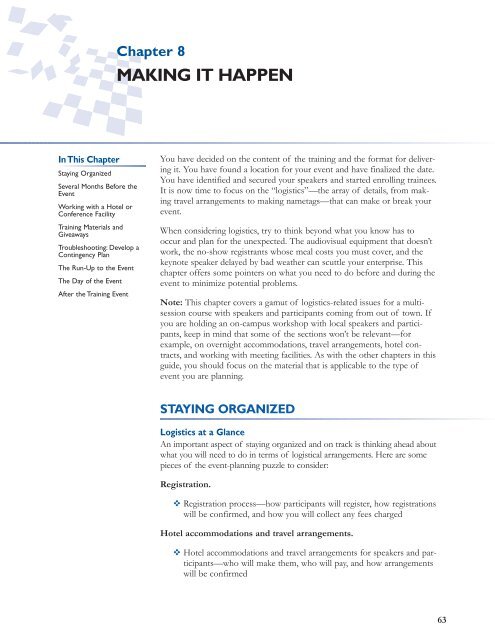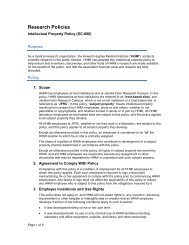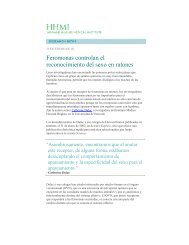Training Scientists to Make the Right Moves - Howard Hughes ...
Training Scientists to Make the Right Moves - Howard Hughes ...
Training Scientists to Make the Right Moves - Howard Hughes ...
You also want an ePaper? Increase the reach of your titles
YUMPU automatically turns print PDFs into web optimized ePapers that Google loves.
Chapter 8<br />
MAKING IT HAPPEN<br />
In This Chapter<br />
Staying Organized<br />
Several Months Before <strong>the</strong><br />
Event<br />
Working with a Hotel or<br />
Conference Facility<br />
<strong>Training</strong> Materials and<br />
Giveaways<br />
Troubleshooting: Develop a<br />
Contingency Plan<br />
The Run-Up <strong>to</strong> <strong>the</strong> Event<br />
The Day of <strong>the</strong> Event<br />
After <strong>the</strong> <strong>Training</strong> Event<br />
You have decided on <strong>the</strong> content of <strong>the</strong> training and <strong>the</strong> format for delivering<br />
it. You have found a location for your event and have finalized <strong>the</strong> date.<br />
You have identified and secured your speakers and started enrolling trainees.<br />
It is now time <strong>to</strong> focus on <strong>the</strong> “logistics”—<strong>the</strong> array of details, from making<br />
travel arrangements <strong>to</strong> making nametags—that can make or break your<br />
event.<br />
When considering logistics, try <strong>to</strong> think beyond what you know has <strong>to</strong><br />
occur and plan for <strong>the</strong> unexpected. The audiovisual equipment that doesn’t<br />
work, <strong>the</strong> no-show registrants whose meal costs you must cover, and <strong>the</strong><br />
keynote speaker delayed by bad wea<strong>the</strong>r can scuttle your enterprise. This<br />
chapter offers some pointers on what you need <strong>to</strong> do before and during <strong>the</strong><br />
event <strong>to</strong> minimize potential problems.<br />
Note: This chapter covers a gamut of logistics-related issues for a multisession<br />
course with speakers and participants coming from out of <strong>to</strong>wn. If<br />
you are holding an on-campus workshop with local speakers and participants,<br />
keep in mind that some of <strong>the</strong> sections won’t be relevant—for<br />
example, on overnight accommodations, travel arrangements, hotel contracts,<br />
and working with meeting facilities. As with <strong>the</strong> o<strong>the</strong>r chapters in this<br />
guide, you should focus on <strong>the</strong> material that is applicable <strong>to</strong> <strong>the</strong> type of<br />
event you are planning.<br />
STAYING ORGANIZED<br />
Logistics at a Glance<br />
An important aspect of staying organized and on track is thinking ahead about<br />
what you will need <strong>to</strong> do in terms of logistical arrangements. Here are some<br />
pieces of <strong>the</strong> event-planning puzzle <strong>to</strong> consider:<br />
Registration.<br />
Registration process—how participants will register, how registrations<br />
will be confirmed, and how you will collect any fees charged<br />
Hotel accommodations and travel arrangements.<br />
Hotel accommodations and travel arrangements for speakers and participants—who<br />
will make <strong>the</strong>m, who will pay, and how arrangements<br />
will be confirmed<br />
63
















